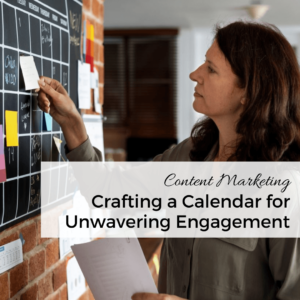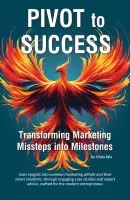As you should already know, since I have yelled this from the top of my marketing soapbox often enough, in marketing consistency is key. But maintaining a steady stream of engaging content isn’t always easy – believe me, I’m an entrepreneur too, and I know. That’s where a well-structured content calendar comes into play. My content calendar (which used to be in a spreadsheet and has now moved into my task management system) is a life saver. But it’s not just about having tasks identified – it’s about being able to develop a
content strategy.
What is a Content Calendar?
A content calendar, also known as an editorial calendar, is a strategic tool that helps you plan, organize, and schedule your content. It’s your roadmap to consistent, high-quality content that resonates with your audience and drives engagement.
Why Do You Need a Content Calendar?
A content calendar helps you
streamline your content creation process, ensuring you never miss a beat. It allows you to plan ahead, align your content with
key events or product launches, and maintain a balanced content mix.
Plus, it’s a great way to ensure your content aligns with your overall marketing strategy, without having to try to figure all of this on the fly during the few minutes you have while you’re dropping the kids off to school.
Building Your Content Calendar: A 5-Step Guide
Creating a content calendar may seem daunting, but with the right approach, it’s a straightforward process. Here’s a step-by-step guide to help you build a content calendar that fuels consistent engagement.
Step 1: Understand Your Audience
Before you start planning your content, you need to
understand your audience. What are their interests? What problems are they facing? What kind of content do they engage with?
Use these insights to guide your content planning process.
Step 2: Define Your Content Themes
Once you understand your audience, it’s time to define your content themes. These are broad categories that your content will revolve around.
For instance, if you’re a marketing agency like Vicky Wu Marketing, your themes might include SEO, content marketing, social media marketing, and so on.
I have had success having quarterly themes for businesses that have several related, yet also different, products or services. Or in some cases, even related but different audience, such as a real estate agent may have buyers, sellers, investors.
Step 3: Plan Your Content
With your themes in place, you can start planning your content.
Consider the type of content that will resonate with your audience and align with your themes. This could be blog posts, videos, podcasts, infographics, or a mix of all these.
However, I do not recommend that you add a new type of content just to have one. If you regularly share image+text posts on social media, suddenly trying to add a podcast or video may create a bottleneck since these take a lot of time and have a learning curve. Look at what content that you’re already producing is getting the best response.
Step 4: Schedule Your Content
Now it’s time to schedule your content. Decide on the frequency of your posts and stick to it.
Consistency is key in content marketing.
Use your content calendar to schedule your posts, ensuring you have a steady stream of content going out.
Most platforms have a built-in way nowadays to schedule content, which makes it easy to schedule ahead (which I always, always recommend for a busy entrepreneur!)
Step 5: Review and Adjust
Finally, remember that
your content calendar isn’t set in stone. We would never want you to think “wow I have this great opportunity that landed in my lap, but oops I need to pass because I already created my content calendar.”
It’s going to be a living, breathing, changing document, so change it up as needed.
Regularly review your content performance and adjust your calendar as needed. This will help you stay responsive to your audience’s changing needs and preferences.
Leveraging Your Content Calendar for SEO
A well-planned content calendar isn’t just a tool for consistency; it’s also a powerful weapon in your SEO arsenal.
Remember, since we take a holistic approach to all of our marketing strategies, we know that SEO isn’t only about your website, but should encompass your entire online presence.
By planning your content in advance, you can optimize it for relevant keywords, ensuring it gets found by the right people. Plus, you can strategically interlink your content, boosting your SEO efforts.
For instance, you might link a post on content marketing strategies to a previous post on SEO techniques and how they all work together, such as my post on
Content Curation – providing your readers with additional value and improving your site’s SEO.
FAQs on Content Calendars
- What should a content calendar include? A content calendar should include the date of publication, content type, title or topic, author, and any relevant notes or keywords.
- How far in advance should I plan my content calendar? This depends on your business and content strategy. Some businesses plan their content a month in advance, while others plan for the entire quarter or year.
- How often should I post new content? The frequency of your posts depends on your resources and audience. However, consistency is key. Whether you post daily, weekly, or monthly, stick to your schedule.
- How can a content calendar improve my SEO? A content calendar can improve your SEO by allowing you to plan and optimize your content for relevant keywords. It also enables you to strategically interlink your content, boosting your site’s SEO.
- Can I adjust my content calendar? Absolutely! A content calendar should be flexible. Regularly review your content performance and adjust your calendar as needed.
Wrapping Up
A content calendar is a powerful tool that can streamline your content creation process, ensure consistency, and boost your SEO efforts. By understanding your audience, defining your content themes, planning and scheduling your content, and regularly reviewing your performance, you can create a content calendar that drives unwavering engagement.
Remember, as an entrepreneur, your zone of genius should be your primary focus. If marketing doesn’t fall into that zone (and it probably does not), consider outsourcing to a professional – like my team here at Vicky Wu Marketing. With a wealth of experience and a proven track record, we can help you navigate the complexities of content marketing, allowing you to focus on what you do best.


